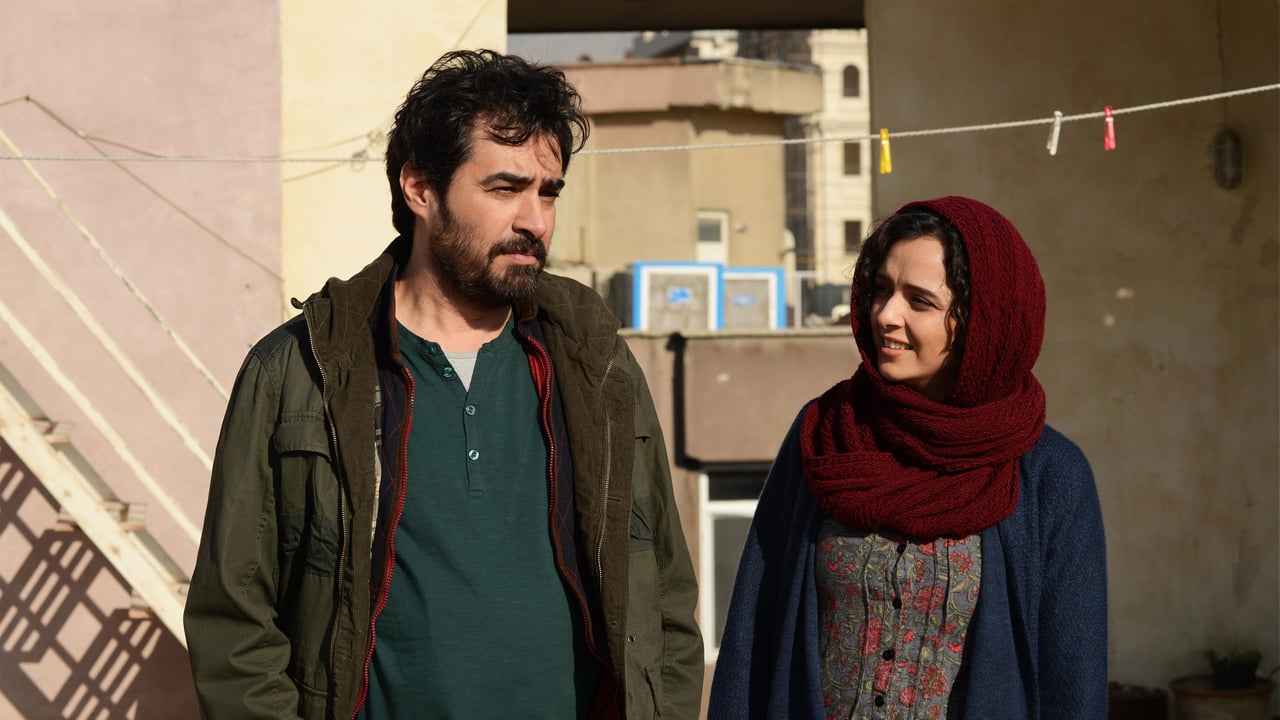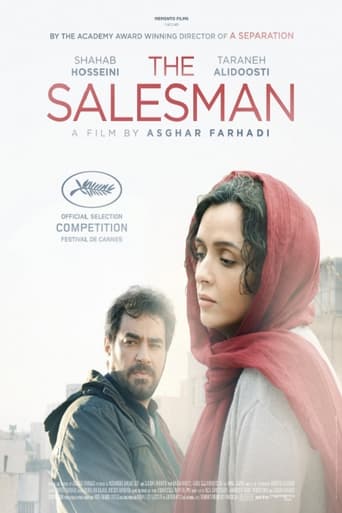Titreenp
SERIOUSLY. This is what the crap Hollywood still puts out?
Ensofter
Overrated and overhyped
Bluebell Alcock
Ok... Let's be honest. It cannot be the best movie but is quite enjoyable. The movie has the potential to develop a great plot for future movies
Myron Clemons
A film of deceptively outspoken contemporary relevance, this is cinema at its most alert, alarming and alive.
p-seed-889-188469
I enjoyed this movie as I was watching it, with my admiration growing and reaching a crescendo up until about 10 minutes from the end, at which point things headed seriously south. But as the credits rolled and the distractions of the brilliance of the acting and execution disappeared a whole wave of questions came crashing down which pretty much destroyed the underpinning logic of the whole story and undoing any redeeming features it may have hadIf you look at the "story" scene by scene there is very little that stacks up as being logical or natural and the whole thing is exposed as a rickety structure stuck together by bits of string and sealing wax by the director/writer to make some point. While this lack of logic might be forgivable if the point was worth the deception, personally I fail to see what exactly that point is, let alone what it might be worth. Speaking of rickety structures, let's talk about the collapsing building first. Surely this must be the most ridiculously outrageous and unlikely scenario ever concocted to provide the relatively simple premise of someone having to find a new flat. Is the art of building in Tehran so basic that this sort of thing happens on a regular basis? Was that quick cut to a piece of digging equipment supposed to imply that this was the cause of this disaster? Really? And what on earth is the whole point of "The death of a salesman" side issue? If this is supposed to be the classic "play within a play" conceit, a la Saura's Carmen, then I must have missed something, for while indeed in the film's coda a (shirt) "salesman" may indeed have died, if there is any similarity beyond that it went right over my head. And the whole crucial set up of why Rana left the door open is totally tenuous to say the least. As for the culprit rushing off leaving his keys, his phone and his pick-up truck? Ridiculous. And just how did that glass get on the stairs and why did the culprit not have his shoes off? And while his socks were found, where were his shoes? And how come the pick-up truck, apparently a crucial part of at least 2 businesses, was allowed to remain at the flat for a number of days without any of said businesses missing it? And what is all the nonsense with the previous tenant leaving all her belongings at the flat, something that is entirely irrelevant to the story. And how did Ehmad suddenly end up at the Hospital and why is he so unmoved by his wife's plight? What exactly did happen to Rana we never find out - it is ridiculous to think the old man hurt her so we can only presume she slipped and hurt her head. Why was it not possible to find out more information on the man's phone, even if it was "cancelled"? Why was the pick-up truck not examined in detail? What was the point of that episode with Ehmad in the car and a lady wanting to change seats? Why would Ehmad think that the driver of the pick-up truck was the culprit when clearly it is a commual vehicle? Why did he not confront the suspect on the spot instead of making up some hare brain story about wanting to move some things? Why would the suspect actually agree to this, and why when he couldn't come in person would he send his future father in law who is half dead and lucky to make it up the stairs? Who is stupid enough to lock a half dead man in a closet for hours?This, then, is the house of cards that forms the backdrop to the "story". So what is the actual "story"? Basically it can be summarised in a very few simple sentences. A woman is "assaulted", although we never find out if this is because she was startled by a peeping tom and slipped, or whether she was bashed over the head. Said woman has PTSD, well fair enough. Woman's husband is not angry but resentful of woman's subsequent behaviour. Husband identifies the "culprit" and threatens to expose him to his family. His wife gives an ultimatum that if he does so she will leave him. For a moment all seems well and the culprit's family start to take him away. Then, for reasons only known to the husband he reneges at the last minute and exposes the culprit to his family. An ambulance arrives the culprit may or may not be dead and the wife walks out the door.If anyone can tell me the meaning of all this they are a better man/woman than I am. If the movie had stopped before Ehmad exposed the culprit it could at least have ended on a poignant note of redemption and forgiveness, a cliche perhaps, but at least a good one and one that would have redeemed the movie despite its many flaws. By allowing Ahmed to expose him the director destroyed any possible payout for the audience and all we are left with is a bunch of question marks set against an artificial world and involving people we really don't care too much about.In conclusion all I can do is echo what I have already said in my review of another movie by this director ("About Elly"), which is that this movie seems largely an academic exercise pretending to be something deeper than what it actually is.
Leonardo
"The Salesman" is a pre-bad (worse than bad) movie; a nugatory one. It neither sells anything nor buy. It is unable to sell and buy and incapable of dealing or discussing at all.It's a not-yet-made, confused and passive movie to which the action happens- from the outside-. It doesn't have any sort of action of its own, let alone character. It's a movie with no story, script, directing, camera-work, or editing.The movie doesn't even have an acceptable "what" due to a hollow script to which anything enters and from which anything exits. The script lacks many necessary things but contains lots of useless ones, instead. Of course, nothing has been aesthetically removed from the script, for nothing is there in the first place. Thus the writer doesn't have anything at all to remove.The movie is incomplete, unfinished and "open". The director doesn't know that an "open" phenomenon is not a phenomenon yet. It can be open only after it is able to be closed and after it is completely finished.Our director, as if he knows that his "The Salesman" needs a lot of effort yet to be a movie, attends lots of interviews and attaches himself to his dumb movie. He pretends to be oppressed, spark controversy about himself, and soothe himself by making a "modern" pretension to be intellectual and relativist. Thus, he pleases himself for "causing the audience to have a mental challenge" and "that the audience is full of questions while coming out of the theatre is of worth" for him.One should remind him that it is not worthy at all if the audience come out of the theatre being confused by lots of unanswered questions. It is not worthy at all if all of those questions are about the "what" of the story but not "how" it is told. it is not worthy at all if the origin of the questions is the audience not facing a specific and finished story by which he can reach the "how" and experience.He (the director) has left us no other choice but to remind him that cinema is neither a horn nor a riddle. A work of art is a live experience, not a proposition or the answer to several questions. Art is not a statement, but the way of stating. The audience's challenge with a good work of art is intuitive and emotional, then intellectual. The intellectual who doesn't have the slightest idea of feelings, is one of the concept-oriented people who can never understand art.The audience's main question about this vague and passive movie is the following: "Is someone raped or just attacked?" In order to pretend that the movie is important, the director decisively says, in one of the interviews, that "no one is raped." Nevertheless, the movie implies the opposite. Not in its mise en scene- which isn't actually there-, but by two dialogues; one is of the wretched violator's ("I was tempted.") and the other one is of the doleful victim's ("I wish I were dead."). In another interview, with a Hitchcock sense of humor- which doesn't fit him at all- the director mentions that he hasn't been in the bathroom, so he doesn't know what has happened.
Mac Murrah
This movie is a beautiful drama, the build up is gradual and the intensity reaches a crescendo during the last 30 minutes which is an absolutely spell binding piece of acting and storytelling.The film shows Iran as a very normal and sensible society yet because of the respect the culture awards older people which makes the climax even more astonishing.It took a while for me to get into it, I was on a flight and was dozing in and out until around 44 minutes before the end, when its just engrossing.
miriamday-35605
More in Sorrow than in Anger. I saw Asghar Farhadi's 'The Salesman' 5 days after the terrorist attacks in Manchester, as pictures of the victims were plastered all over the press in a basic violation of their privacy. 'The Salesman' explores the impact of a random act of violence on a marriage. In the wake of the attack, the victim's needs are entirely overlooked as her husband usurps the drama and makes it about himself: his sense of 'his' territory being invaded and polluted, his fragile identity, his anger, his hatred, his violence, his desire for revenge - all of which override the needs and wishes of the actual victim who, ultimately, does not want anyone else to be hurt in her name. In the last century 90% of the victims of war have been civilians - a large proportion of them women and children. In civil conflicts, from Ireland to Bosnia, it is often civilians - particularly women - who build informal bridges between communities. Yet they have been historically excluded from formal peace processes which are brokered between the warring parties - invariably men - this despite research showing that negotiations which include women are more successful. The Salesman explores all this through the psychology of one relationship: a subtle and timely film.

